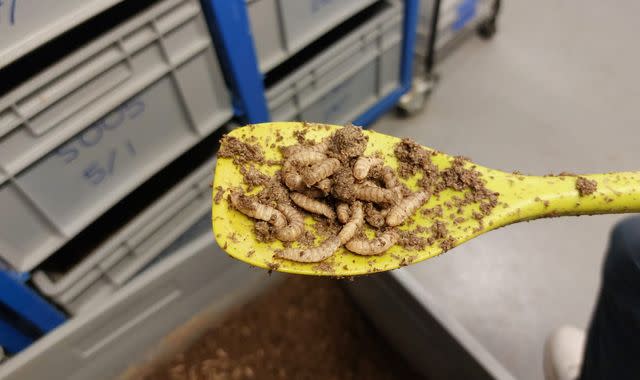Inside the fly farm breeding millions of flies for food

Under a railway arch in London Bridge, scientists are farming millions of flies.
In a single crate, there are thousands waiting to be bred. Once their eggs are harvested, the larvae are fattened up on food waste.
"You can see they've grown quite massively in five days - and they're definitely more wiggly," says entomologist Myles Townsend.
The larvae are surprisingly smelly - an unfortunate side effect of eating, as they release ammonia.
But despite their appearance and clingy smell, they could solve a big problem in the UK. Once they get fat and juicy, they could be fed to farm animals like chicken, fish and pigs, instead of soy, which has a massive environmental impact.
Many farm animals in the UK are fed soy. It's been linked with deforestation in the Amazon, and degradation of ecosystems. And just by needing the space to grow, scientists have pointed out that it is causing problems - growing food for livestock uses a third of the world's cropland.
Because insects can be farmed locally, don't take up much space, and eat food waste, an increasing number of people think they could help reduce the environmental impact of meat. In fact, WWF says feeding some farm animals insects could remove over half a million tonnes of soy from UK consumption.
Keiran Whitaker is the founder of Entocycle, the company building fly factories in London Bridge. He thinks it is also about food security - we're able to farm flies in the UK but not soy.
"We need to produce more protein. We import up to 80 to 90% of it. What happens if that suddenly gets taken away from us? We need that food security, and that's what insect protein can do."
Keiran's company is now developing the technology to farm insects on a massive scale. They've made machines to count tens of thousands of fly eggs in seconds, built robot arms to automate the process and will have huge stacks of larvae growing at a time.
But how we make our food is strictly regulated and some experts say regulation is slowing down progress in the insect industry. While the EU now allows insects to be fed to chickens, pigs and fish, in the UK, only fish are allowed.
Rachel O'Connor is an agricultural lawyer at Michelmore who has worked on insect protein law for years. "No other sector faces the regulatory challenges that insect protein has in the UK and in the EU. We have very strict regulations around animal feed, quite rightly so."
The BSE crisis - or 'mad cow disease' - and the foot-and-mouth disease were linked back to our livestock eating 'mammalian meal' (ground-up animal parts), so regulations were tightened to prevent a similar crisis happening again.
But now, Rachel says the restrictions need to be loosened.
"What we need to do is to allow certain safe and properly researched and scientifically supported exceptions. So in the EU we have already had that law passed. We now are permitted at an EU level to feed insects to chickens and pigs. And we need to do that in the UK so that we don't continue to fall behind."
If the law does change, these creepy crawlies could be fattening up your pork chops in the very near future - that's certainly what this industry is banking on.


